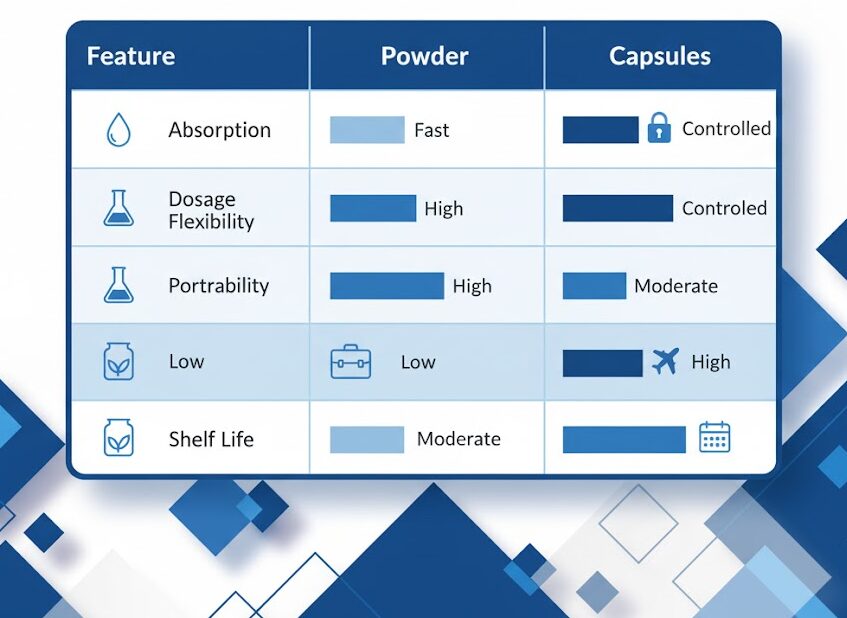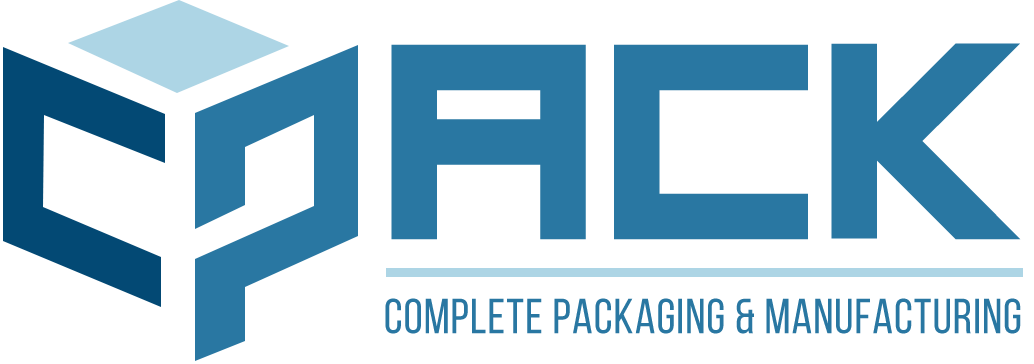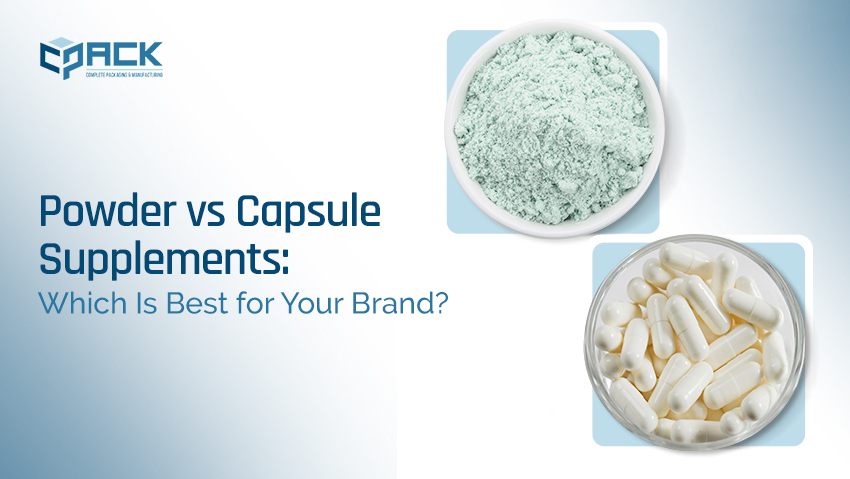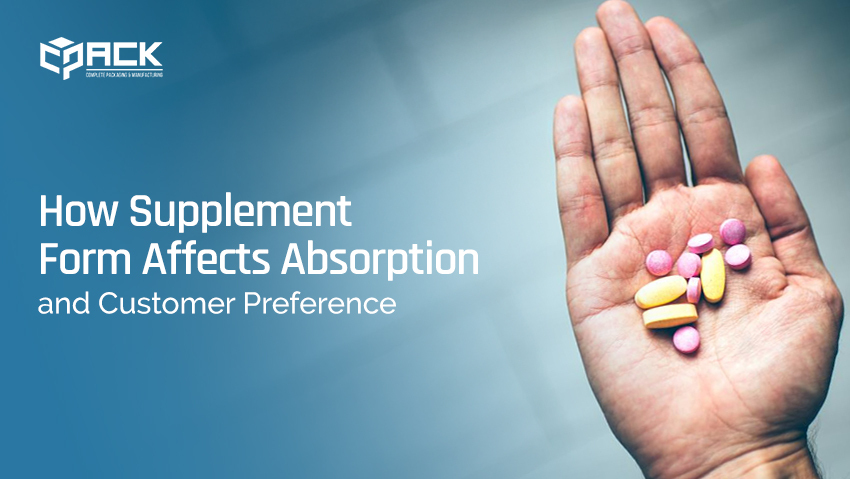If you’re building a supplement brand, one of your first big decisions is this: “Should you go with powder supplements or capsules?” Both forms have their own manufacturing processes, benefits, and consumer appeal.
Because the choice you make can influence everything from absorption rates to brand positioning, let’s have a look at what suits your brand, whether it’s a powder supplement or a capsule entity.
Capsule or Powder, What Does the Research State?
According to a report, the global dietary supplement market was valued at $177.5 billion in 2023 and is expected to grow at a compound annual growth rate (CAGR) of 9.0% through 2030.
This growth is being driven largely by powder-based functional products in sports nutrition, wellness, and nutraceutical blends.
At the same time, capsules remain a staple in vitamin, mineral, and herbal supplement categories, thanks to their convenience and perceived premium quality.
What is Powder Supplement Manufacturing?
Powder supplements are among the most versatile forms on the market. From protein powders to pre-workouts, greens blends, and functional wellness mixes. Powders appeal to consumers who value flexibility in dosage, mixability, and flavour customization.
How Powder Supplements Are Made
At Cpack, our custom powder manufacturing process is designed to support brands that want unique formulas and fast market entry. The process includes:
- Ingredient sourcing – Only high-quality, tested ingredients are selected.
- Blending – Ingredients are thoroughly mixed to ensure uniformity.
- Flavouring and testing – Taste and solubility are optimized for consumer satisfaction.
- Packaging – Powders are filled into tubs, sachets, or stick packs based on brand preference.
A key advantage of powders is that they don’t require encapsulation, making production faster and more cost-effective. Powders are ideal for larger serving sizes, such as protein or greens blends, where capsules would be impractical.
Challenges and Considerations While Making Powder Supplements
While powders are versatile, they come with challenges:
- Clumping – Moisture can affect flowability.
- Flavour masking – Bitter or herbal ingredients may require advanced flavouring.
- Mixability – Consumers expect powders to dissolve easily in liquids.
Who Should Consider Powders?
- Fitness and performance brands – Pre-workouts, recovery blends, protein powders.
- Nutraceutical brands – Greens, reds, collagen, and functional blends.
- Consumers seeking customization – Adjustable serving sizes or mix-in options.
Pro Tip: Brands looking to launch quickly can leverage Cpack’s stock formula powders, which offer pre-tested blends to accelerate time to market.
Capsule Supplement Production and Encapsulation Process
Capsule supplements are preferred by consumers who prioritize convenience, precise dosing, and portability. Capsules dominate in vitamins, minerals, and herbal extracts, especially when the exact dosage is critical.
The Encapsulation Process
Cpack’s custom capsule manufacturing involves several key steps:
- Mixing and granulation – Ingredients are blended uniformly for consistent potency.
- Encapsulation – Using advanced machinery, powders are filled into gelatin or vegetarian (HPMC) capsules.
- Polishing and inspection – Capsules are polished, inspected, and checked for quality and appearance.
- Bottling and labelling – Customized to your brand’s design and compliance requirements.
We also offer stock formula capsules for brands that want fast launches without R&D delays.
Types of Capsules
- Gelatin capsules – Traditional, easy to swallow, widely used.
- Vegetarian (HPMC) capsules – Ideal for plant-based brands and allergen-free products.
- Specialized capsules – Enteric-coated, slow-release, or probiotic encapsulations for sensitive ingredients.
Who Should Consider Capsules?
- Premium wellness or clinical-grade brands – High-value vitamins, minerals, and herbal extracts.
- On-the-go consumers – Easy to carry, no preparation required.
- Formulas need odour/taste masking – Especially herbal or bitter ingredients.
Industry Insight: Capsules offer longer shelf life, better ingredient protection, and controlled-release options that can enhance customer satisfaction.
Absorption and Bioavailability: Powders vs Capsules

One of the most debated topics in supplement formulation is bioavailability. One should know how efficiently the body absorbs and utilizes nutrients.
Powders: Faster Absorption
Powder supplements generally absorb faster because they don’t require capsule dissolution. Mixed with liquid, nutrients are immediately available for digestion. This is why athletes and fitness enthusiasts prefer powders for pre-workout and recovery products.
According to a 2023 article from the National Institutes of Health (NIH), liquid and powder supplements tend to have higher bioavailability because they bypass the breakdown stage required by capsules or tablets.
Capsules: Controlled and Consistent
Capsules may take slightly longer to digest, but they provide:
- Consistent dosing – Every capsule contains the exact amount of active ingredients.
- Protection from moisture and oxidation – Enhances shelf life.
- Targeted delivery – Enteric-coated capsules release nutrients in specific parts of the digestive tract, which are beneficial for gut health supplements.
If you want a more detalied analyses that covers the updated ares, look for Cpack’s guide on Capsules vs Liquid Supplements: What Absorbs Faster?
Pro Tip: Consider capsules for sensitive compounds like probiotics, enzymes, or herbal extracts.
Consumer Preference and Market Trends
A smart marketer is the one who builds trends by understanding their targeted audience and demands. Understanding your audience might be a little critical when choosing a supplement form. But research would be worth it if we look at it in the long run.
- A 2024 survey found 58% of supplement users prefer capsules for ease of swallowing and convenience, while 42% choose powders for mixability and flavour.
- Younger demographics (Millennials and Gen Z) lean toward powders, associating them with fitness, smoothies, and daily wellness rituals.
- Capsules dominate in longevity, vitamin, and immune support categories, especially for busy professionals seeking convenience.
Brands that align their form with consumer behaviour are more likely to drive repeat purchases and loyalty.
How to Choose Between Powder and Capsule Supplements (Without Second-Guessing Yourself)
I’ve seen founders agonize over this choice for months. And I get it. Make the wrong call, and you could be stuck with inventory that doesn’t resonate with your audience.
Start With Your Brand’s Identity (Not What’s Trending)
Before you look at costs or suppliers, ask yourself this:
What transformation are you promising your customers?
This matters more than you think.
Powders naturally communicate energy, flexibility, and customization. When someone scoops powder into a shaker bottle, they feel like they’re in control of their nutrition. It’s active. It’s engaged.
Capsules, on the other hand, signal something completely different: precision, trust, and medical-grade quality. There’s a reason doctors don’t prescribe protein powder—capsules carry an authority that powders simply can’t match.
So if your brand promise is about high-performance fitness and personal optimization? Powders probably fit better.
But if you’re positioning yourself as a science-backed wellness brand for busy professionals? Capsules might be your answer.
Match Your Format to Your Actual Customer (Not Your Ideal One)
Here’s where most brands go wrong: they choose a format based on who they want to attract, not who’s actually buying.
Let me break down what the data shows:
Powders resonate with:
- Fitness enthusiasts in their 20s and 30s
- People who already use supplements regularly
- Customers who value customization over convenience
- Active social media users who share their routines
Capsules connect with:
- Health-conscious professionals (30-55)
- Supplement beginners looking for simplicity
- People who travel frequently
- Customers who prioritize discretion and ease
Notice I didn’t say “millennials vs. boomers.” That’s too simplistic.
The real difference? It’s about lifestyle and supplement experience level.
A 25-year-old lawyer who travels three days a week might prefer capsules. A 45-year-old CrossFit coach might swear by powders.
Know your actual customer, not the demographic stereotype.
Run the Numbers (Because Passion Doesn’t Pay Bills)
I’m going to be straight with you: capsules cost more upfront.
Encapsulation equipment, minimum order quantities, and per-unit costs are all higher. If you’re bootstrapping your brand, that matters.
Here’s what you need to know:
Capsules require:
- Higher initial investment ($3,000-$10,000+ for private labeling)
- Larger minimum orders (often 500-1,000 units minimum)
- Longer lead times (8-12 weeks aren’t unusual)
Powders offer:
- Lower barrier to entry (can start with stock formulas for under $2,000)
- Faster speed to market (sometimes as quick as 4-6 weeks)
- More flexibility to test different flavors and formulations
But here’s the flip side: capsules often have better margins long-term because customers perceive them as premium products.
So if you have $5,000 to launch? Powders might be your only realistic option. But if you have $15,000 and a clear market? Capsules could build a stronger brand foundation.
Think Three Products Ahead
This is the question nobody asks (but everyone should):
Where do you want your product line to be in 12 months?
If your vision includes:
- Multiple flavors or serving sizes → Powders give you room to experiment
- A focused, premium line of 2-3 hero products → Capsules let you own a niche
- Rapid iteration based on customer feedback → Powders are easier to reformulate
I’ve seen brands launch with capsules and struggle to expand because each new SKU requires significant investment.
But I’ve also seen powder brands get lost in flavor fatigue, launching coconut-vanilla-chai variations that nobody asked for.
The format you choose shapes your growth strategy more than you realize.
Why a Trusted Manufacturing Partner is Mandatory
When you’re creating a supplement brand, having a reliable manufacturing partner can make all the difference. You want someone who really knows their stuff.
From turning your ideas into finished products to making sure everything works as it should. It helps if they understand the science behind formulations, how capsules and powders behave, and how to keep products stable.
Plus, a partner who follows strict standards like proper testing and compliance. This makes you feel confident that every batch is safe, effective, and high-quality. In the end, it’s about having that peace of mind for both you and your customers.
FAQs: Powder vs Capsule Supplements
Q1: Are powders absorbed faster than capsules?
Yes. Powders mix with liquid and bypass the breakdown stage, making nutrients available more quickly.
Q2: Which form is more convenient for consumers?
Capsules are easier to take on the go, while powders may require mixing.
Q3: Can powders handle sensitive ingredients like probiotics?
Some sensitive ingredients are better suited to capsules, especially if they require protection from moisture or stomach acid.
Q4: Are capsules more expensive to produce?
Generally, yes. Encapsulation machinery and specialized coatings can increase costs compared to powders.
Conclusion
Choosing between powder and capsule supplements is more than a production decision. It’s a strategic brand choice, a decision that builds your brand’s authority. So, your selection should align with:
- Brand identity
- Consumer expectations
- Budget and timeline
- Product scalability
At Cpack Manufacturing, we don’t just produce supplements; we help brands build trust, loyalty, and profitability. Whether you’re drawn to the customizability of powders or the precision of capsules, we’ll help you create products your customers love.






